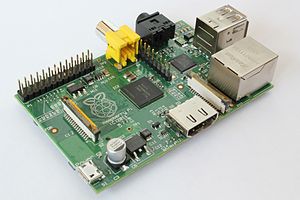Notice: This Wiki is now read only and edits are no longer possible. Please see: https://gitlab.eclipse.org/eclipsefdn/helpdesk/-/wikis/Wiki-shutdown-plan for the plan.
TCF/Raspberry Pi
Contents
Getting TCF to run on the Raspberry Pi
The Raspberry Pi is a tiny, cheap single-board computer that is powerful enough to play HD video. It runs Linux on its ARMv6 chip, connects a monitor and a keyboard for stand-alone work, and provides all the necessary tools to get started quickly. TCF needs a network, so the instructions here are for a "Type B" Raspberry Pi which should cost around 25 $. Getting it up and running is quick and easy:
Building the TCF Agent
Getting TCF up and running is really easy if your Pi has a network - this shouldn't take more than 15 minutes depending on your network connection for the downloads:
- Prepare an SD Card (4 GB recommended) with the Raspbian Image to boot your device. We used "wheezy" for this.
- Connect native monitor and keyboard. Finish setup wizard, type “ifconfig”. Read IP address from eth0.
- If you can't get a monitor and a keyboard, you can use a tool like the advanced IP scanner
Now you're ready to rock and roll on the keyboard
# (Replace n.n.n.n by the actual IP address that you read) ssh pi@n.n.n.n / password : raspberry sudo apt update sudo apt install git make gcc uuid-dev libssl-dev libc6-dbg git clone https://git.eclipse.org/r/tcf/org.eclipse.tcf.agent.git cd org.eclipse.tcf.agent/agent make obj/GNU/Linux/arm/Debug/agent -L- -l0
The last command actually launches the agent, for testing.
Installing the Agent for auto-start
One benefit of running TCF on the device is the TCF auto-discovery: It allows to connect to a headless device (without keyboard and monitor) quickly even without knowing its IP address. For that to work right after powering on the device, you'll need to register the TCF agent for auto-start:
cd org.eclipse.tcf.agent/agent make install # Review the files installed into /tmp sudo make install INSTALLROOT= sudo update-rc.d tcf-agent defaults sudo update-rc.d tcf-agent enable sudo service tcf-agent start
Connecting the TCF Debugger to the Pi
- Get Eclipse, it is recommended to use the Eclipse IDE installer package
- Launch it, choose Help > Install New Software and install the most recent version from the releases:
- https://download.eclipse.org/tools/tcf/releases/1.7/1.7.0/
- You can safely install all of TCF (will also get you the sources)
- Allow to restart, then switch to the Target Explorer Perspective
- Your Pi should show up under "Neighborhood". Here, you can also set up a new remote debug configuration.
Advanced Configuration
VNC
You can install a VNC server on the Pi - the TCF source repository on git://git.eclipse.org/gitroot/tcf/org.eclipse.tcf.git has an experimental VNC integration:
sudo apt-get install tightvncserver
There's more details on this Blog on setting up VNC on the Pi.
NFS
You can install an NFS server on the Pi - provides access to source code and debug objects that you compile right on the Pi:
# purge rpcbind and nfs-common to avoid [warn] Not starting: portmapper is not running ... (warning). sudo apt-get purge rpcbind sudo apt-get purge nfs-common sudo apt-get install rpcbind sudo apt-get install nfs-kernel-server nfs-common sudo nano /etc/exports # add the following line : # / *(rw,sync,no_subtree_check,insecure) #restart your nfs deamon /etc/init.d/nfs-kernel-server restart

